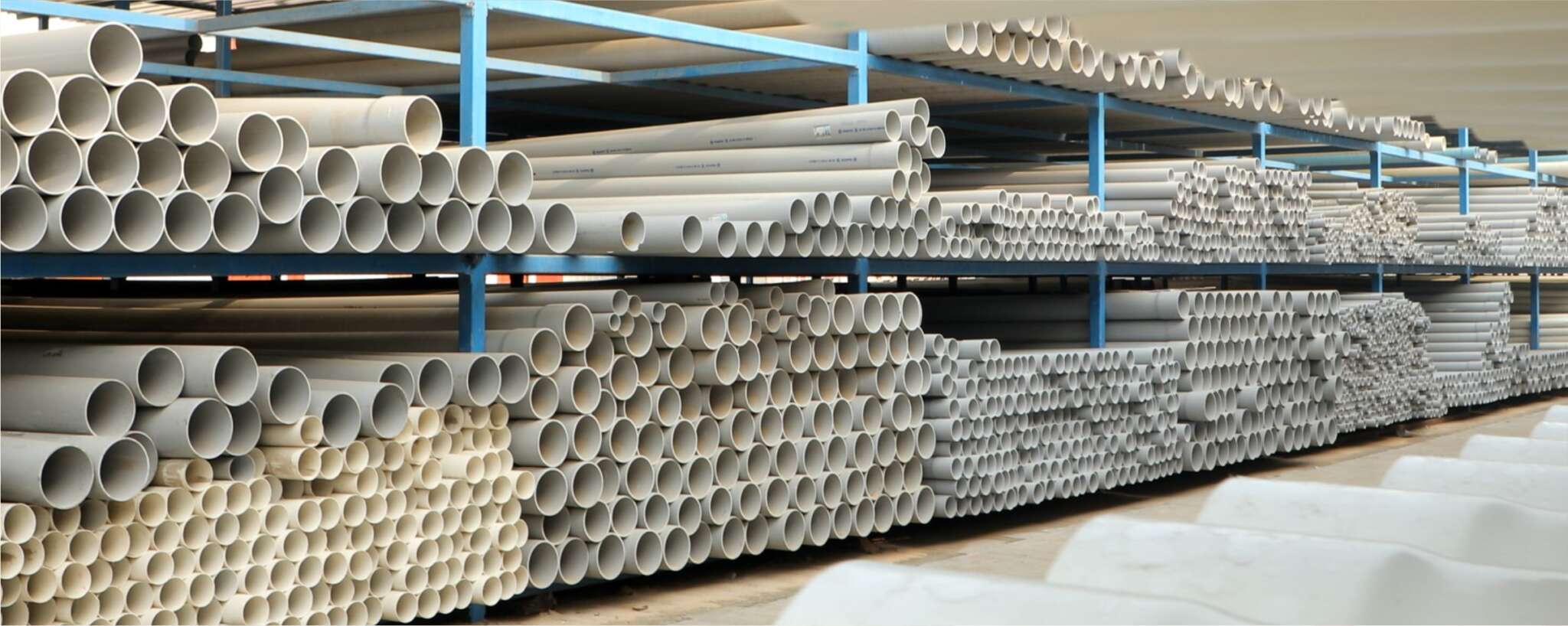
PVC PIPES
Global employment of PVC (Polyvinyl Chloride) pipes is prevalent due to their versatility in serving a wide array of applications, encompassing water supply, drainage, irrigation, and sewerage systems. These pipes are crafted from PVC, a thermoplastic material synthesized from the vinyl chloride monomer.
The merits of PVC pipes over alternative materials are as follows:
Lightweight: PVC pipes are lightweight, simplifying their handling, transportation, and installation.
Corrosion Resistance: PVC pipes exhibit resistance to corrosion, rendering them ideal for deployment in corrosive settings.
Durability: PVC pipes prove to be durable, maintaining their integrity over several years with minimal degradation.
Cost-Effective: PVC pipes are relatively economical when compared to alternative materials, offering a cost-efficient solution for diverse applications.
PVC pipes are available in various sizes and lengths to accommodate different needs. They come in different types, including:
Unplasticized PVC (uPVC): These pipes are rigid and characterized by high strength and durability, making them suitable for high-pressure applications.
Plasticized PVC (pPVC): These pipes are flexible and can be bent without breaking, making them suitable for situations requiring flexibility.
Chlorinated PVC (CPVC): These pipes possess enhanced heat resistance and mechanical strength in comparison to regular PVC pipes, making them suitable for high-temperature applications.
In summary, PVC pipes, with their excellent properties and characteristics, prove to be a versatile material for a myriad of applications. Their affordability, longevity, and resistance to corrosion make them a popular choice across various industries.
CPVC PIPES
CPVC pipes constitute a plastic piping system fashioned from chlorinated polyvinyl chloride (CPVC) resin, renowned for its exceptional durability, elevated temperature resistance, and chemical resilience.
CPVC pipes find utility in various applications, including hot and cold water distribution systems, industrial piping, and fire sprinkler systems. They are extensively employed in residential, commercial, and industrial settings, including chemical processing plants and oil refineries.
A primary advantage of CPVC pipes is their ability to withstand high temperatures, withstanding up to 200°F (93°C) without degradation. This makes them a suitable choice for hot water distribution systems.
Furthermore, CPVC pipes exhibit high resistance to corrosion and chemical attack, making them a reliable option for use in demanding environments such as industrial and chemical processing facilities.
In terms of installation, CPVC pipes are lightweight and straightforward to work with. They can be easily cut, joined, and installed using solvent cement, establishing a robust bond between the pipes and fittings.
In summary, CPVC pipes provide a dependable and cost-effective solution for a broad spectrum of applications. It is imperative to adhere to local codes and manufacturer guidelines for proper installation to ensure their long-term performance and safety.
UPVC PIPES
Unplasticized PVC (uPVC) plumbing pipes are a favored choice for potable water supply systems and various plumbing applications. These pipes are esteemed for their remarkable durability, corrosion resistance, and cost-efficiency, rendering them a reliable and budget-friendly plumbing solution.
The chief advantages of uPVC plumbing pipes encompass their resistance to corrosion and chemical aggression, making them highly suitable for plumbing systems that handle diverse fluids and substances.
Installation and maintenance of uPVC plumbing pipes are straightforward. They can be readily cut to the required size using various cutting tools and can be seamlessly interconnected using a variety of fittings and connectors. These attributes contribute to their versatility and convenience in plumbing applications.
Furthermore, uPVC plumbing pipes are lightweight and feature a smooth interior surface that inhibits the buildup of sediment and scale. This aids in maintaining water flow and reducing the risk of blockages and other plumbing issues.
In conclusion, uPVC plumbing pipes present a cost-effective and reliable plumbing solution for a wide range of applications. It is crucial to ensure that they are installed in compliance with local regulations and manufacturer guidelines to ensure their enduring performance and safety.
